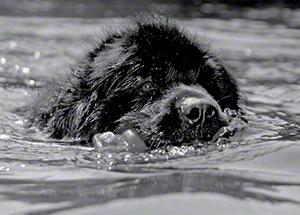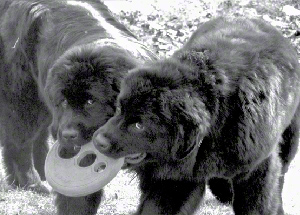by Tracy Warncke
Your breeder stressed that you must keep your puppys run/yard clean. Not once a week or once in a while, but every day. Did your breeder tell you to take a plastic bag with you every time you walk the dog? Were you shown the "insert, grab, reverse and tie" method? "WHAT ARE YOU TALKING ABOUT?" you ask? POOP! Yes, dog poop!
Sanitation is one of the most important factors in keeping your dog healthy. It is also a subject that many people don't want to talk about, but we are going to discuss it in this column. Improper sanitation may spread: intestinal parasites, which, if severe enough may kill a dog; viruses; and draw flies not to mention, stinks and is just plain unsightly.
Most intestinal parasites are spread by a dog coming in contact with contaminated ground. Eggs from the parasites are deposited with the feces and may live for several months before finding a new host. Failure to remove feces daily or twice daily dramatically increases the likelihood that the eggs from an infected dog will find their way into the ground. Your dog comes along and sniffs the ground coming in contact with the eggs and a few weeks later - you guessed it - your dog is infected.
Viruses such as canine parvovirus, corona, distemper, and infectious canine hepatitis are shed into the feces. Most can live for months just waiting for a dog to infect. Some are deadly, others self-limiting, all are preventable. Preventable through proper sanitation and vaccination.
Failure to "scoop the poop" draws flies. If your dog is in the vicinity, the flies will eventually find your dog. Noses and ears are their favorite landing spots. A dog whose ears are being attacked by flies will shake his head frequently to remove the offending pests. This may lead to an ear flap hematoma (collection of blood in the tissues of the ear flap). Surgery is usually required to drain the excess blood to prevent scarring and deformation of the ear flap.
Noses, on the other hand may be bitten until bloodied. Most dog will rub their noses on the ground or paw their noses to relieve the biting. If a dog rubs its nose on the ground it may be scratched and end up infected necessitating a trip to the vet. Constant pawing of the face may lead to scratches from the nails. Both lead to eventual hair loss and possible scarring.
Remember the last time you stepped in dog poop? Ill bet you had a few choice comments for the irresponsible dog owner who allowed their dog to make its deposit and failed to clean it up. Be a responsible dog owner. Carry a plastic bag (bread bags work very well) with you when ever you leave your property. If your dog should make a deposit here's a quick and easy way to remove the evidence.
Put your hand inside the bag and pick up the pile. Pull your hand back through the opening. The poop is now inside the bag and has not come in contact with your hand. Tie the bag in a not and deposit in the nearest waste receptacle.
I usually carry two bags - one for me and one for any owner we meet just in case they "forgot" theirs.
A bucket filled with bleach and water will readily disinfect your cleanup tools. Make sure you empty the bucket in a safe place and never leave it where the dogs might drink from it. If you should experience recurring problems with intestinal parasites, talk to your veterinarian about a sanitation program. He may recommend treating your run/yard with any number of products available that will eradicate your problem.
Finally, regular scooping will alert you to any changes in your dog's bowel habits, which could be cause for concern. When you call your vet to tell him your dog isn't feeling well, the first questions he will ask are:
1. Is he eating and drinking?
2. Does he have a temperature?
3. Is there any sign of vomiting or diarrhea?
4. What is the consistency and color of the stools?
Happy Scooping!

